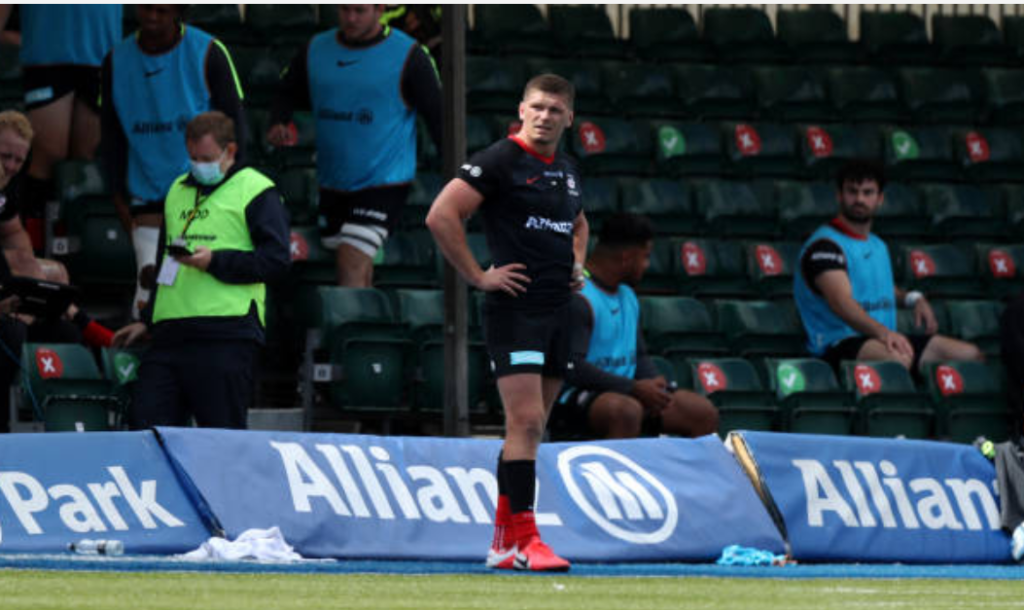The process followed in Owen Farrell’s five-match suspension is another demonstration that rugby’s judiciary is in dire need of an overhaul, writes DYLAN JACK.
After a lengthy disciplinary hearing on Tuesday night, it was confirmed around midnight that Farrell had received just a five-match suspension for a dangerous tackle in this past Saturday’s clash between Saracens and Wasps.
Farrell was shown a red card by referee Christopher Ridley for the horrible-looking hit on Wasps’ Charlie Atkinson, who is currently recovering from the head knock.
Although the disciplinary panel concluded that this was a top-end offence with an entry point of 10 matches, it was concluded there were no aggravating features. Following testimonials from Farrell’s Saracens coach Mark McCall and England coach Eddie Jones, as well as (strangely) founders of a charity with whom Farrell works, the suspension was halved to just five matches.
It means Farrell will miss Saracens’ Champions Cup quarter-final against Leinster, but the irony is that he will return to action around the same time as Atkinson, who is unable to train at the moment as he recovers from a concussion.
However, this has again called into question the legitimacy and decision-making processes of these disciplinary panels.
Although Farrell has become renowned for repeated offences with such tackles, he has often gone unpunished on the field, which has meant these misdemeanours couldn’t be factored into Tuesday’s decision-making.
The fact that testimonials from three potentially biased parties were considered should also be something that changes. While McCall and Jones have both worked closely with Farrell for a number of years, they obviously would have wanted him back on the field as soon as possible.
The citing process itself shouldn’t be a citing of character, it should be a citing of the incident. Whether a player is of good character or does charity work shouldn’t factor into the ultimate decision.
In the ruling, independent panel chair Mike Hamlin referred to that the panel had decided Farrell’s tackle was ‘reckless and not intentional’.
However, as on-field referees have already decided, intent is such a tricky thing to rule on and therefore should not come into the decision-making.
For example, look at tennis star Novak Djokovic’s recent disqualification from the US Open. Djokovic – one of the favourites to win – was disqualified after hitting a line judge with a ball in frustration during just the fourth round of the tournament.
Whether Djokovic intended to hit the line judge didn’t matter as Grand Slam rules clearly state: ‘Players shall not at any time physically abuse any official, opponent, spectator or other person within the precincts of the tournament site.’ Breaking this rule just once, intentional or not, allows the match referee to disqualify the player.
Farrell’s ban was not the only controversial one to be handed out over the past few days. Bristol Bears coach Pat Lam expressed his frustration that centre Siale Piutau had been handed a three-match ban after being cited for punching Worcester Warriors lock Andrew Kitchener, who was also handed a three-match ban.
‘I am extremely frustrated,’ Lam told BT Sport. ‘The messages of inconsistency is what I am struggling with. Siale was attacked by two guys who started swinging at him. The process means you cannot strike back.
’The message is that you can start a fight and punch someone with the same penalty [three matches]. You should be able to defend yourself if someone attacks you like that. Things have got to change.’
Former England wing Ugo Monye, speaking on BT Sport before the Farrell ban was decided, made an excellent point when he questioned how a player can get his sentence halved due to his previous record.
‘The fact is, the whole process has been flawed for years,’ Monye said. ‘The fact that you can go in and get your ban halved just because of records or pleading guilty is appalling.’
My own suggestion would be that an early guilty plea, remorse and a clean record should no longer be taken as mitigating factors. These are normal reactions that should be expected of any professional player. Rather, if the player is clearly not remorseful and doesn’t plead guilty, the ban should be added to.
Monye also questioned whether the judicial process was supporting World Rugby and their referees’ quest to make the game safer.
‘Since lockdown has come out, referees have said the decisions on the pitch, they want them to make sense,’ Monye added. ‘We need the judiciary process to also make sense. At the moment it just doesn’t.’
At this moment it seems far too easy – and it is happening far too often – for players to get significant reductions on their sentences for dangerous tackles. We need judiciaries to start ruling on facts, rather than feelings.
If rugby is to rid itself of dangerous incidents of play – or at least significantly reduce them – it needs support from the judiciary, who needs to impose a maximum sentence where possible.





